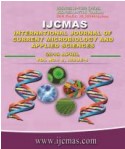


 National Academy of Agricultural Sciences (NAAS)
National Academy of Agricultural Sciences (NAAS)

|
PRINT ISSN : 2319-7692
Online ISSN : 2319-7706 Issues : 12 per year Publisher : Excellent Publishers Email : editorijcmas@gmail.com / submit@ijcmas.com Editor-in-chief: Dr.M.Prakash Index Copernicus ICV 2018: 95.39 NAAS RATING 2020: 5.38 |
This in-vitro study evaluates the antibacterial &antifungal action of aqueous & alcoholic extracts of new herbal vaginal formulation containing equal amounts of Symplocos racemosa Roxb. and Ficus glomerata Roxb. stem barks against gram positive and gram negative bacteria and candid fungus by using the methods of zone of inhibition and minimum inhibition concentration (MIC) to assess its efficacy in treating vaginitis. During phytochemical analysis, alkaloids, flavonoids, tannins and carbohydrates were found to be present in both extracts. Total phenol content (TPC) determined using the Folin- Ciocalteu reagent was found to be 225.67 and 220.00µg Gallic acid equivalent/mg in the aqueous and alcoholic extract respectively. The results of minimum inhibition concentration study suggest higher antimicrobial activity by the alcoholic extract than the aqueous extract and more pronounced antibacterial action than the anti-fungal action by both extracts. The MIC values were also higher in case of fungal species as compared to all the bacterial species, while among the bacterial species, MIC was found to be higher in case of gram negative bacteria than gram positive bacteria except Staphylococcus aureus. Determination of the diameter of zone of inhibition during disk diffusion study suggested higher antibacterial action than anti-fungal action, and stronger antibacterial effect upon Gram positive bacteria than Gram negative bacteria by all extracts. The alcoholic extract exhibited higher zones of inhibition than aqueous extract for all antimicrobial categories. Similarly, antimicrobial efficacy of alcoholic extract using 8 mg per disk drug dosage was a little lower but comparable to effect of the standard drugs at 10µg/disc level. The overall antimicrobial effect of the research extracts was significant and comparable but a little lower when compared to the standard drugs.
 |
 |
 |
 |
 |